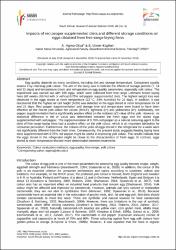| dc.contributor.author | Okur, Aylin Ağma | |
| dc.contributor.author | Kayhan, E. Ünver | |
| dc.date.accessioned | 2022-05-11T14:46:38Z | |
| dc.date.available | 2022-05-11T14:46:38Z | |
| dc.date.issued | 2018 | |
| dc.identifier.issn | 0375-1589 | |
| dc.identifier.uri | https://doi.org/10.4314/sajas.v48i5.19 | |
| dc.identifier.uri | https://hdl.handle.net/20.500.11776/10338 | |
| dc.description.abstract | Egg quality depends on many conditions, including diet and storage temperature. Consumers usually assess it by checking yolk colour. The aim of the study was to indicate the effects of storage periods (7, 14 and 21 days) and temperature (room and refrigerator) on egg quality parameters, especially yolk colour. The experiment was carried out with 150 eggs, which were collected from free-range Lohmann brown laying hens (42 weeks old) fed with or without 0.75% red pepper supplemented diets. The highest weight loss was observed in the eggs stored at room temperature (23 degrees C, 64% humidity) for 21 days. In addition, it was discovered that the highest air cell height (ACH) was detected in the eggs stored at room temperature for 14 and 21 days. Red pepper supplementation and storage time and temperature were found to have been effective on the Roche yolk colour fan values (RYCF), lightness (L*) and yellowness (b*). Additionally, red pepper supplementation had a significantly positive effect on the redness (a*) value of the yolk. However, no statistical difference in the a* value was determined between the fresh eggs and the stored eggs supplemented with red pepper. The supplementation of 0.75% red pepper as a natural colouring agent to the diets of free-range laying hens had a positive effect on the yolk colour, which is an important attribution for consumer perception. Furthermore, the colours of the yolks of eggs stored in the refrigerator for a week were not significantly different from the fresh ones. Consequently, the present study suggests feeding laying hens diets supplemented with 0.75% red pepper might be useful in improving yolk colour. The results indicate that the eggs stored in the refrigerator might be closer to the characteristics of fresh eggs. In contrast, eggs stored at room temperature showed more deterioration between treatments. | en_US |
| dc.language.iso | eng | en_US |
| dc.publisher | South African Journal Of Animal Sciences | en_US |
| dc.identifier.doi | 10.4314/sajas.v48i5.19 | |
| dc.rights | info:eu-repo/semantics/openAccess | en_US |
| dc.subject | Colour evaluation methods | en_US |
| dc.subject | egg quality | en_US |
| dc.subject | free-range | en_US |
| dc.subject | yolk colour | en_US |
| dc.subject | Synthetic Pigment Materials | en_US |
| dc.subject | Yolk Pigmentation | en_US |
| dc.subject | Quality | en_US |
| dc.subject | Performance | en_US |
| dc.subject | Carotenoids | en_US |
| dc.subject | Systems | en_US |
| dc.subject | Lutein | en_US |
| dc.subject | Corn | en_US |
| dc.subject | Feed | en_US |
| dc.title | Impacts of red pepper supplemented diets and different storage conditions on eggs obtained from free-range laying hens | en_US |
| dc.type | article | en_US |
| dc.relation.ispartof | South African Journal of Animal Science | en_US |
| dc.department | Fakülteler, Ziraat Fakültesi, Zootekni Bölümü | en_US |
| dc.authorid | 0000-0001-6678-765X | |
| dc.identifier.volume | 48 | en_US |
| dc.identifier.issue | 5 | en_US |
| dc.identifier.startpage | 987 | en_US |
| dc.identifier.endpage | 996 | en_US |
| dc.institutionauthor | Okur, Aylin Ağma | |
| dc.institutionauthor | Kayhan, E. Ünver | |
| dc.relation.publicationcategory | Makale - Uluslararası Hakemli Dergi - Kurum Öğretim Elemanı | en_US |
| dc.authorwosid | OKUR, Aylin AGMA/G-2981-2018 | |
| dc.identifier.wos | WOS:000454603500012 | en_US |



















